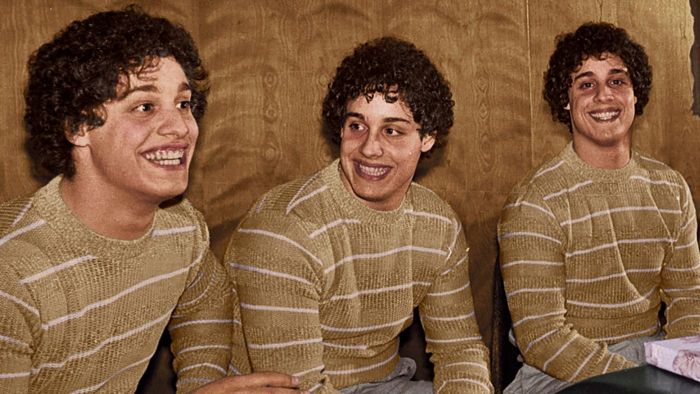Three identical strangers questions and answers: Dive into the captivating story of triplets separated at birth and reunited decades later, sparking ethical debates and profound questions about identity, family, and the nature of human experimentation.
Uncover the fascinating details of their separation, the ethical implications, the search for identity, the impact on their families, the media frenzy, and the lasting legacy of this extraordinary experiment.
1. The Three Identical Strangers
An Overview

The Three Identical Strangers is a 2018 documentary film that tells the story of three identical triplets who were separated at birth and raised in different families. The film follows the triplets as they reunite in adulthood and learn about the experiment that led to their separation.
The triplets, Robert Shafran, David Kellman, and Eddy Galland, were born in 1961 in New York City. They were adopted by different families and raised in different states. In 1980, Robert Shafran enrolled at Sullivan County Community College in New York and quickly became friends with David Kellman.
The two realized they were identical twins and began to search for their third brother. They eventually found Eddy Galland and the three brothers were reunited in 1980.
2. The Ethical Implications

The separation of the triplets raised a number of ethical issues. The researchers who conducted the experiment did not obtain informed consent from the triplets’ parents. The parents were not told that their children would be separated and raised in different families.
The researchers also did not tell the triplets about their true identities. The triplets were not told that they were identical twins until they were reunited in adulthood.
The separation of the triplets had a profound impact on their lives. The triplets struggled with identity issues and mental health problems. They also had difficulty forming relationships with others. The triplets’ families were also affected by the separation. The parents of the triplets were distraught when they learned that their children had been separated.
The families of the triplets struggled to come to terms with the fact that their children had been raised in different families.
3. The Search for Identity: Three Identical Strangers Questions And Answers

After the triplets were reunited, they struggled to find their identities. They had been raised in different families and had different experiences. Robert Shafran was raised in a wealthy family and attended private schools. David Kellman was raised in a middle-class family and attended public schools.
Eddy Galland was raised in a poor family and attended a boarding school for troubled youth.
The triplets’ different experiences shaped their personalities. Robert Shafran was confident and outgoing. David Kellman was shy and reserved. Eddy Galland was angry and rebellious. The triplets also had different interests and hobbies.
Robert Shafran was interested in music and art. David Kellman was interested in science and math. Eddy Galland was interested in sports and cars.
4. The Impact on the Family
The reunion of the triplets had a profound impact on their families. The parents of the triplets were overjoyed to be reunited with their sons. The families of the triplets were also relieved to learn that their sons were alive and well.
The triplets’ reunion also brought the families closer together.
The triplets’ reunion also had a positive impact on the triplets’ children. The triplets’ children were able to learn about their uncles and cousins. The triplets’ children also learned about the importance of family.
5. The Media Frenzy
The story of the triplets received a lot of media attention. The triplets were featured in newspapers, magazines, and television shows. The triplets also appeared on talk shows and documentaries. The media attention was overwhelming for the triplets. They were not used to being in the spotlight.
The media attention also made it difficult for the triplets to adjust to their new lives.
The media attention also raised a number of ethical issues. The media often portrayed the triplets as freaks. The media also exploited the triplets’ story for ratings. The media attention was harmful to the triplets. It made it difficult for them to find jobs and form relationships with others.
6. The Legacy of the Experiment

The separation of the triplets had a profound impact on their lives and the lives of their families. The experiment also raised a number of ethical issues. The experiment has led to changes in the way that research is conducted on human subjects.
The experiment has also led to a greater awareness of the importance of informed consent.
The legacy of the experiment is complex. The experiment has had a negative impact on the lives of the triplets and their families. The experiment has also raised a number of important ethical issues. The experiment has led to changes in the way that research is conducted on human subjects.
The experiment has also led to a greater awareness of the importance of informed consent.
Commonly Asked Questions
What was the ethical issue raised by the triplets’ separation?
The triplets were separated without the knowledge or consent of their parents, raising ethical concerns about the rights of human subjects in research.
How did the experiment impact the triplets and their families?
The separation had a profound impact on the triplets’ psychological and emotional development, as well as on their families, who were unaware of their existence for decades.
What role did the researchers and adoption agency play in the experiment?
The researchers and adoption agency were responsible for the triplets’ separation and for withholding information about their true identities from them and their families.
How did the media attention surrounding the triplets’ story impact their lives?
The media attention brought intense scrutiny and pressure on the triplets, which further complicated their search for identity and their relationships with their families.
What are the implications of the triplets’ separation experiment for future research on human subjects?
The experiment highlights the importance of informed consent, ethical guidelines, and long-term follow-up in human subject research.